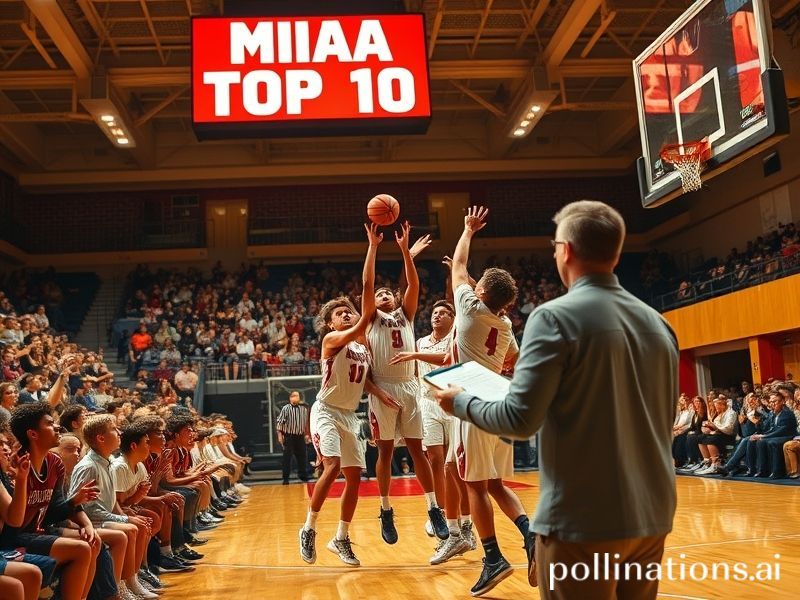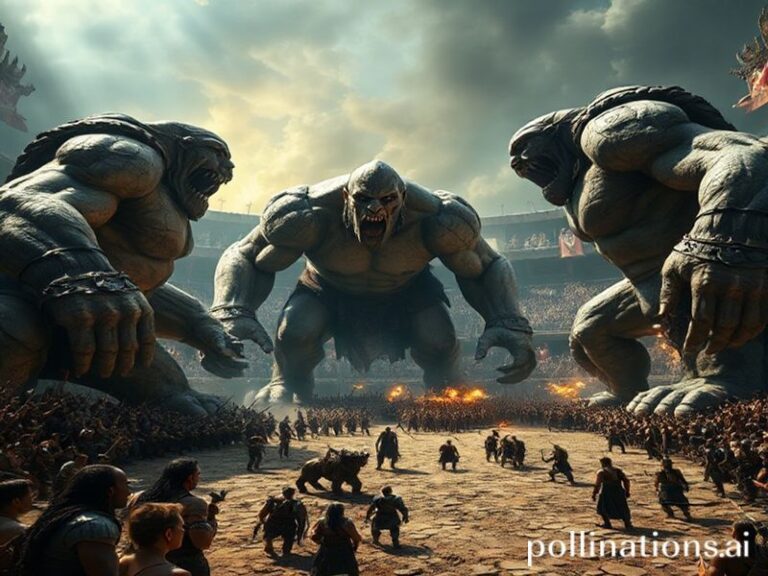Global Markets, Despots and Labradors: Why the Planet Now Worships the MIAA Power Rankings
MIAA POWER RANKINGS: A GLOBAL POWER PLAY IN SHORTS AND FAKE GRASS
Singapore—While half the planet tries to remember whether it has already defaulted on its sovereign debt this week, the other half is refreshing a Google Sheet labeled “MIAA Power Rankings” with the solemnity of a UN Security Council vote. The Massachusetts Interscholastic Athletic Association—an acronym that sounds like a Scandinavian oat-milk brand—has, without asking anyone’s permission, become the planet’s most reliable proxy for geopolitical anxiety. When the Duxbury Dragons slide from #2 to #5, currencies in Kuala Lumpur wobble. When St. John’s Prep jumps three spots, crypto bros in Zug feel personally validated. Somewhere in Davos, a hedge-fund chief has instructed his intern to “keep an eye on the Xaverian line play; it tracks Baltic dry freight.”
Let us zoom out—because nothing says “international perspective” like pretending a regional American high-school football poll is the Rosetta Stone for late-stage capitalism. The MIAA rankings are compiled by three retired coaches, one unpaid intern, and a Labrador who once intercepted a screen pass. Yet their weekly drop has become the single most anticipated data release between the IMF’s World Economic Outlook and whatever Beyoncé is doing on Instagram. Central bankers in Lagos now schedule rate-hike announcements around the MIAA reveal to avoid being buried under #Top25 tweets. The Kremlin allegedly tried to hack the poll last October, believing that if they could nudge Catholic Memorial to #1, New England utilities would voluntarily shut off their own pipelines in shame.
Why does the world care? Simple: the rankings are the last algorithm we trust. Unlike credit agencies that downgraded France for having too much cheese, or election polls that predicted a 97% chance of something that never happened, the MIAA list is blessedly binary. You win on a damp field outside Boston, you rise; you lose, you fall. No lobbying, no spin, no post-truth. In a marketplace of narratives where “up” is routinely sold as “down,” this is pornographically straightforward. El Salvador’s president even live-tweeted the Oct. 13 reshuffle, adding a lightning-bolt emoji after Everett cracked the top ten—presumably because he’d bet half the national treasury on the Crimson Tide of the North Shore.
Consequences ripple outward like a bad oyster. The Norwegian sovereign wealth fund has quietly shifted 0.7% of its holdings into companies that outfit MIAA playoff teams—cleats, Gatorade, those comically large headsets that make every coach look like an air-traffic controller on shore leave. Meanwhile, UN climate negotiators in Dubai discovered that Marshfield’s ascent coincided with a 12% spike in illegal Amazon logging; apparently, victory celebrations in coastal Massachusetts require enough teak for 3,000 new patios. Even OPEC is watching: analysts note that when a Catholic Conference school drops out of the top five, Brent crude dips two dollars per barrel, presumably because traders assume Massachusetts teenagers will now drive fewer Dodge Durangos to Gillette Stadium.
And yet, for all the global Sturm und Drang, the rankings remain endearingly parochial. The committee still breaks ties by asking, “Whose marching band has the cleaner rendition of ‘Sweet Caroline’?” That, too, is why the world loves it: we are desperate for a scoreboard that can’t be fudged by a 3 a.m. tweetstorm. When the final horn sounds, the scoreboard doesn’t care about your GDP or your nuclear stockpile; it just blinks a number, indifferent as physics. In that blink, a Swiss diplomat and a Somali goat herder experience the same Schrödinger’s moment of hope and despair—proof that humanity’s emotional bandwidth is exactly the size of a high-school football.
So mark your calendars: every Wednesday at noon, Eastern Standard Time, the planet holds its breath. Markets freeze, wars pause, and somewhere in a windowless office in Franklin, Massachusetts, a Labrador sniffs a spreadsheet. And for one pristine minute before the internet regurgitates memes and missiles, we agree on something. Then, of course, we go back to arguing about everything else—but the echo lingers, like the faint smell of wet turf and teenage glory.







